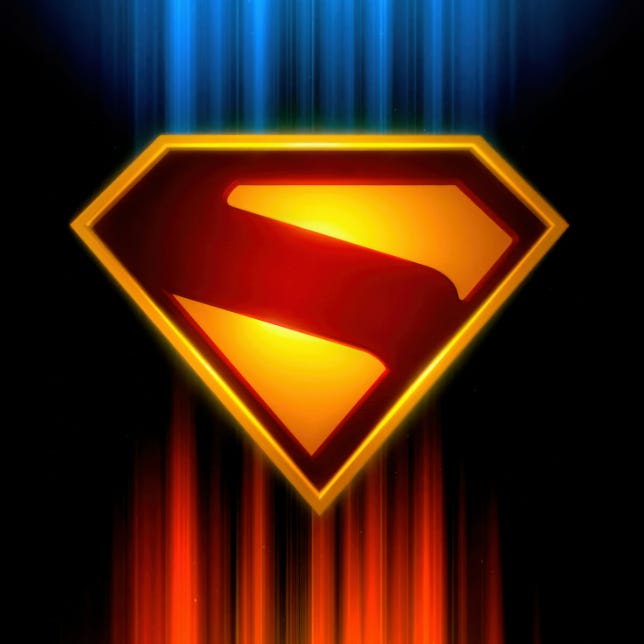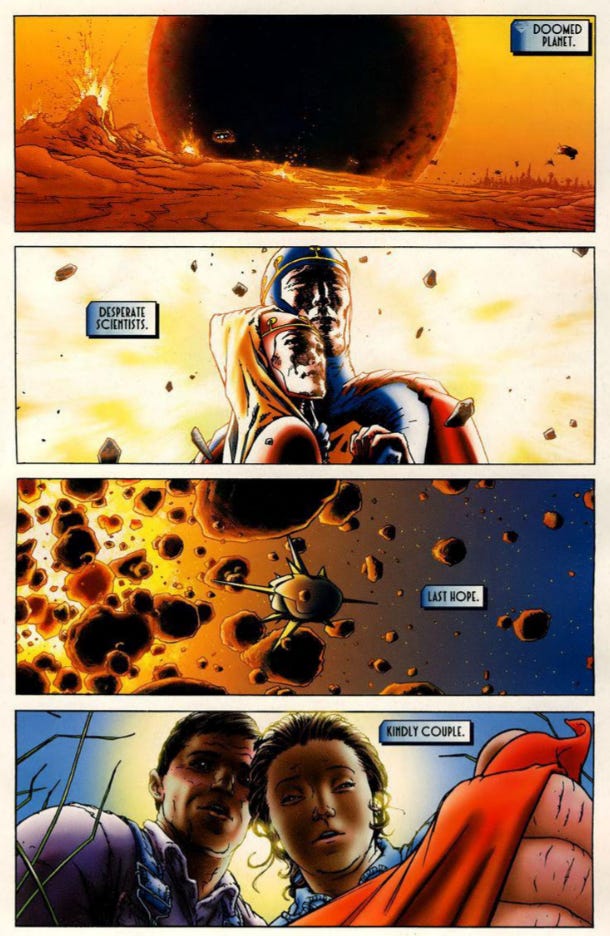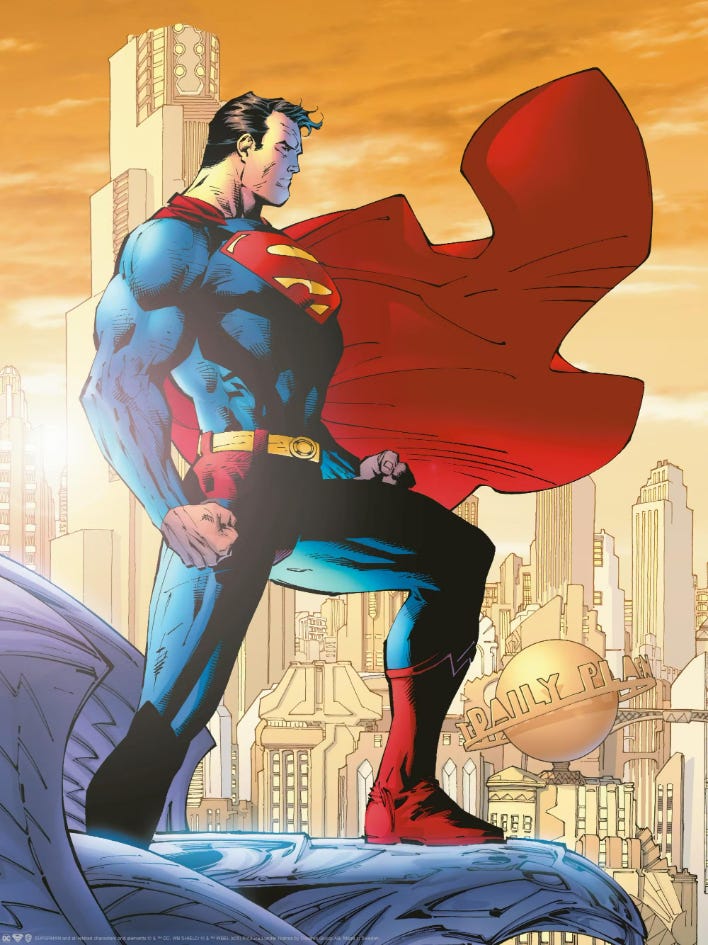Superman Explained My Entire Ethical Framework in Two Lines
How James Gunn’s Superman captured the core of my philosophy on being good in a broken world.
I was so excited to see the new Superman this month. The past two decades of superhero films have been a boon to a nerd like me. I literally cheered in the theater during the climax of The Avengers during the iconic shot of the assembling for the first time.
And the end of Avengers: Endgame, when *REDACTED* lifted *REDACTED*? And when the *REDACTED* *REDACTED*? And when *REDACTED* said, “*REDACTED*… *REDACTED*!”
Screams of joy from me.
But that was the MCU. What about DC, and Big Blue? What about Superman?
Well… in Zack Snyder’s Man of Steel Superman defeats General Zod by…
*checks notes
…breaking Zod’s neck.
Oof. Not great.
The MCU is Fantastic. Or it will be finally when the first family of Marvel makes their MCU debut. But for all their success, it’s hard to improve on the original.
Superman is my favorite superhero. No, check that, Superman is my favorite hero, full stop. He’s often thought of as this simple hero for children. Saving cats from trees. Punching silly aliens. The Big Blue Boy Scout. But he’s so much more than that.
There is real moral complexity in the Man of Tomorrow. You just need to peak a little under the hood, and it’s there. But it’s never been on the big screen.
And yes, I am including the Christopher Reeve films. Don’t get me wrong, he’s iconic in the role. But those films didn’t really explore what is beneath the surface.
So I was incredibly excited to see James Gunn take the helm of the franchise. His Guardians of the Galaxy trilogy for the MCU had not only all the action and excitement of the best superhero films, but they also had real emotional and moral texture that is rare in most films, not just genre ones.
James Gunn has a knack for silliness and sincerity that is respectful to the source material without winking to the camera. Yes, that’s a walking tree and a talking racoon. And yes, they have pathos… so much pathos.
I went in to Superman with the highest of expectations. And I came out disappointed.
Not disappointed in the film, mind you. If I could grind it up into a powder I would do so and shoot it into my veins. From start to finish it’s a straight dopamine hit. 10/10… no notes.
I was disappointed because I wanted to make a moral framework for being good in a chaotic world, but James Gunn beat me to it.
Actually, Joe Shuster and Jerry Siegel beat me to it by nearly 90 years...
Well… shit.
I don’t want to spoil the film for anyone with too many details, but these two lines absolutely nailed what I have spent thousands of words trying to say on this Substack.
“Your choices, Clark. Your actions. That’s what makes you who you are...”
– there’s Architectural Humanism in 12 words…
Pack it up I guess. Time to go home.
But Superman is hot right now, and I could use a viral piece. So let’s dive in to see how Superman embodies the ethics of how I try to find my way in our chaotic world where no aliens are coming from the stars to save the day.
To start with, Supes does not try to transcend his humanity, a la Nietzsche's Übermensch. He seeks to embrace and embody it. It’s right there in the quote:
Superman: “I'm as human as anyone. I love, I get scared. I wake up every morning and despite not knowing what to do, I put one foot in front of the other and I try to make the best choices I can. I screw up all the time, but that is being human. And that's my greatest strength.”
There’s the Ledger and its moral reckoning. “How?” you might ask? Let’s get into it.
The foundational idea of the Ledger is this. You make yourself present, you understand the impact of your choices, and every day you try to be better.
The Ledger accounts for your impact on the world and gives you the tool you need to be better tomorrow. To “try to make the best choices I can”.
“But he’s Superman,” You might say, “he has it easy, he is so overpowered, it’s easy for him to be good.”
Aye, Strawman, you see, that’s where you’re wrong. Yes, Superman can do things, amazing things that no mere mortal can do. But his abilities make his moral choices much more difficult.
I’ve already introduced the idea that “You owe me nothing, I owe you everything” and explored a little about how agency and power colors what you can realistically give. More to come on that, by the way… click that subscribe button!
To overly simplify, the moral expectations on a billionaire far exceed those of the entry level worker in one of his companies.
What are the expectations on a man who seemingly can do anything? What is the obligation of a man who breaks the very laws of physics? After all, with great power comes great responsibility.
Wait… strike that line, wrong guy. And not just because that’s Spider-man’s whole deal. But also because Superman is fictional, both in our world, and in his.
The person, the real person, is Clark Kent.
Clark Kent. Adopted son of Kansas farmers.
“Doomed planet.
Desperate scientists.
Last hope.
Kindly couple.”
― Grant Morrison, All-Star Superman, Vol. 1
Clark is a simple guy. He just wants to help people. He’s not cool. He probably likes Nickelback.
And no one would argue that he needs to be anything other than Clark. Even just being a guy with a byline at The Daily Planet can affect a lot of good. And to most people, that’s all he is.
But Clark knows what he is. Clark knows what he is capable of. He can see through our walls. He can hear all the cries for help. And he knows he can help. Across all depictions, Clark is keenly aware of those he can help.
That’s why Clark created Superman. To help in ways no one would expect Clark to help. But here’s the thing, even as Superman, a man who can fly, who can shoot lasers from his eyes, who in some versions is strong enough to move planets, he has limits.
If Superman is fighting a giant robot, he can hear everyone he’s not saving. Every choice to help in one place is simultaneously a choice not to be helping somewhere else. Every minute spent as Clark Kent is one when Superman is not rescuing people from a disaster.
And he knows. Hell, he writes about it for a living. He witnesses. He is aware. He fails. Clark Kent fails to meet the standard of Superman every single day.
But still he says, “I put one foot in front of the other and I try to make the best choices I can. I screw up all the time, but that is being human.”
Ultimately that’s it. That’s the point of all of this moral philosophy. Your ledger records your debts not in judgement, but in understanding of who you are. It records your credits not for valorization, but foundation, upon which you can build to greater things.
You can always be better tomorrow. Just like the Man of Tomorrow.






> Superman is my favorite superhero.
There was a time when superman was underrated, but that doesn't seem to be the case anymore. Anyway, I still like Spiderman, or more niche Baymax (or *even more* niche ̴M̴e̴g̴a̴ ̴G̴i̴r̴l̴ Alison Green) more, however Superman is still cool.
> His Guardians of the Galaxy trilogy for the MCU had not only all the action and excitement of the best superhero films, but they also had real emotional and moral texture that is rare in most films, not just genre ones.
*Spoilers for GotG 3* I got teary eyed watching them rescue the animals. It's so common for heroes, even of the "purely good" and "super" variety to not give a shit about animals. Apathy towards animal suffering seems to be woven into the fabric of our society itself. If I became superman one of the first things I would do is release all the animals from factory farms. I saw superman rescue a dog in the trailer so it appears Gunn is once again extending his empathy to non-humans too, god bless that man.